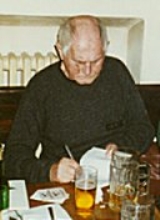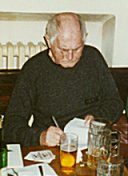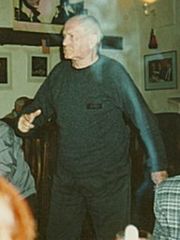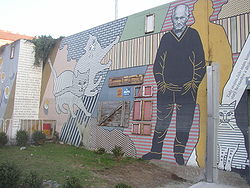
Bohumil Hrabal
Encyclopedia

Brno
Brno by population and area is the second largest city in the Czech Republic, the largest Moravian city, and the historical capital city of the Margraviate of Moravia. Brno is the administrative centre of the South Moravian Region where it forms a separate district Brno-City District...
– 3 February 1997, Prague
Prague
Prague is the capital and largest city of the Czech Republic. Situated in the north-west of the country on the Vltava river, the city is home to about 1.3 million people, while its metropolitan area is estimated to have a population of over 2.3 million...
) was a Czech writer, regarded as one of the best writers of the 20th century.
Life and work
Bohumil Hrabal was born in BrnoBrno
Brno by population and area is the second largest city in the Czech Republic, the largest Moravian city, and the historical capital city of the Margraviate of Moravia. Brno is the administrative centre of the South Moravian Region where it forms a separate district Brno-City District...
(Balbínova ul. 47, Židenice district http://www.brna.cz/home-mmb/?acc=profil_ulice&load=262) in what was then the province of Moravia in the Austro-Hungarian empire to an unmarried mother, Marie Božena Kiliánová (b. 1894-d. 10 February 1970). According to the organisers of a recent Hrabal exhibition in Brno, his biological father was “probably” Bohumil Blecha (b.1893-d, 1970), who was a year older than Marie, a friend from the neighbourhood and the son of a teacher. Marie’s parents opposed the idea of their daughter marrying Blecha, who was about to enter the imperial armyhttp://brnensky.denik.cz/rozhovor/hrabal-dostal-sest-petek-a-v-brne-skoncil20090328.html. Blecha served on the Italian front, before being invalided out of servicehttp://www.novinky.cz/kultura/42858-hrabal-dostal-jmeno-bohumil-po-otci.html. Blecha’s daughter, Drahomíra Blechová-Kalvodová, says her father told her when she was 18 that Hrabal was her half-brother. Bohumil and his biological father never met formally, according to Blechová-Kalvodová. Hrabal and Blechová-Kalvodová met twice; a dedication in a picture from 1994 says: "To sister Drahomíra, Hrabal! 28. 3. 94."
Hrabal was baptised Bohumil František Kilián. Until the age of three, he lived principally with his grandparents, Kateřina Kiliánová (née Bartlová)(d. 1950)http://brnensky.denik.cz/rozhovor/hrabal-dostal-sest-petek-a-v-brne-skoncil20090328.html and Tomáš Kilián (d. 1925, a descendant of a French soldier injured at the battle of Austerlitz, on the outskirts of Brno), in Brno while his mother worked in Polná
Polná
Polná is a town with around 5,000 inhabitants in the Vysočina Region of the Czech Republic.Founded in the second half of the 12th century, it is first mentioned in a written document in 1242. At that time, there had already been a church in Polná. Originally, Polná was a forest collier settlement,...
as an assistant book-keeper in the town's brewery. She worked there with her future husband, František Hrabal (b. 1889-d. 5 June 1966); a František Hrabal was listed as Bohumil's godfather when he was baptised on 4 February 1914, but František was also the first name of Bohumil's future step-grandfather, a soft-drinks trader. František Hrabal, Hrabal’s stepfather, was a friend of Hrabal’s probable biological father, according to Blechová-Kalvodová.
Marie and František married in February 1916, shortly before Bohumil's second birthday. Hrabal's half-brother, Břetislav Josef Hrabal, was born later that year (b. 25 September 1916-d. 30 May 1985); Břetislav (Slávek) is said to have been an excellent raconteurhttp://brnensky.denik.cz/rozhovor/hrabal-dostal-sest-petek-a-v-brne-skoncil20090328.html. The family moved in August 1919 to Nymburk
Nymburk
Nymburk is a city in the Central Bohemian Region of the Czech Republic, located 45 km east of Prague on the Elbe River. It is also home to the Czech men's basketball team ČEZ Basketball Nymburk...
, a small town on the banks of the Labe (Elbe), where František Hrabal became the brewery's manager http://www.pivovary.info/historie/p/polna.htm. Both of Hrabal's parents were active in amateur dramatics.
Hrabal’s uncle was Bohuslav Kilián (1892–1942), a lawyer, journalist and publisher of the cultural magazines Salon and Měsíc (the latter had a German version, Der Monat, that was distributed throughout Europe, but not in Nazi Germany).
In 1920, Hrabal began at the primary school in Nymburk. In September 1925, he spent one year at a grammar school in Brno (now Gymnázium třída Kapitána Jaroše, which was later attended by another famous Czech writer, Milan Kundera
Milan Kundera
Milan Kundera , born 1 April 1929, is a writer of Czech origin who has lived in exile in France since 1975, where he became a naturalized citizen in 1981. He is best known as the author of The Unbearable Lightness of Being, The Book of Laughter and Forgetting, and The Joke. Kundera has written in...
). He failed the first year; he later attended a technical secondary school in Nymburk. There too he struggled to concentrate on his studies, despite extra classes given to him by his unclehttp://brnensky.denik.cz/rozhovor/hrabal-dostal-sest-petek-a-v-brne-skoncil20090328.html.
In June 1934, Hrabal left school with a certificate that said he could be considered for a place at university on a technical course. Hrabal took private classes in Latin for a year, passing a state exam in the town of Český Brod
Ceský Brod
Český Brod is a town in the Central Bohemian Region of the Czech Republic. It is located 35 km east of Prague and had a population of 6,637 in 2005.Rock for People, an annual summer music festival was held in Český Brod from 1995 to 2006...
with an 'adequate' grade on 3 October 1935. Four days later, on 7 October 1935, he registered at Prague
Prague
Prague is the capital and largest city of the Czech Republic. Situated in the north-west of the country on the Vltava river, the city is home to about 1.3 million people, while its metropolitan area is estimated to have a population of over 2.3 million...
's Charles University to study for a Law degree
Law degree
A Law degree is an academic degree conferred for studies in law. Such degrees are generally preparation for legal careers; but while their curricula may be reviewed by legal authority, they do not themselves confer a license...
. He completed the course only in March 1946 as Czech universities were closed during the Nazi occupation, starting in November 1939. During the war, he worked as railway labourer and dispatcher in Kostomlaty, near Nymburk, an experience reflected in one of his best-known works Ostře sledované vlaky (Closely Observed Trains). He worked variously as an insurance agent (September 1946-July 1947), a travelling salesman (September 1947-1949) and as a manual labourer alongside the graphic artist Vladimír Boudník
Vladimír Boudník
Vladimír Boudník was a key figure in Czech post-war art, and a representative of the "explosionism" movement...
in the Kladno steelworks (1949–1952), an experience that inspired the "hyper-realist" texts he was writing at the time. After a serious injury, he worked in a recycling mill in the Prague district of Libeň
Liben
Libeň is a Cadastral area and district of Prague. It was connected to Prague in 1901.- People :* Herz Homberg, born here* Ernestine Schumann-Heink, born here* Bohumil Hrabal, lived here...
as a paper-packer (October 1954-February 1959), before working as a stagehand (18 February 1959-1 January 1962) at the S. K. Neumann Theatre (Divadlo S. K. Neumanna, now Divadlo pod Palmovkou).
Hrabal lived in the city from the late 1940s onward, for much of it (1950–1973) at 24 Na Hrázi ul. in Prague - Libeň; it was demolished in the spring of 1988. In 1956, Hrabal married Eliška Plevová ('Pipsi' to Hrabal, and in some of his works), the 30-year-old (b. 3 May 1926) daughter of Karel Pleva, a procurator and manager of a wood factory in the South Moravian town of Břeclav
Breclav
Břeclav is a town in the South Moravian Region, Czech Republic, approximately 55 km southeast of Brno. It is located at the border with Lower Austria on the Dyje River. The nearest large town on Austrian territory is Hohenau an der March...
. In 1965, the couple bought a country cottage in Kersko, near Nymburk; the cottage became home to his numerous cats. Eliška died in 1987 (31 August).
Hrabal began as a poet, producing a collection of lyrical poetry in 1948 (Ztracená ulička). It was withdrawn from circulation when the communist regime was established. In the early 1950s, Hrabal was a member of an underground literary group run by Jiří Kolář, an artist, poet, critic and central figure in Czechoslovak culture. (Another member of the group was the novelist Josef Škvorecký.) Hrabal produced stories for the group, but did not seek publication.
Two stories by Hrabal (Hovory lidí) appeared in 1956 as a supplement in the annual Zprávy spolku českých bibliofilů (Report of the Association of Czech Bibliophiles). It had a print-run of 250. Hrabal's first book was withdrawn a week before publication, in 1959. It was eventually published in 1963, as Perlička na dně (Pearl on the Bottom). In the same year, he became a writer by profession. Taneční hodiny pro starší a pokročilé (Dancing Lessons for the Advanced in Age) followed in 1964 and Ostře sledované vlaky (Closely Observed Trains) in 1965.
After the invasion of Czechoslovakia by troops from the Warsaw Pact
Warsaw Pact
The Warsaw Treaty Organization of Friendship, Cooperation, and Mutual Assistance , or more commonly referred to as the Warsaw Pact, was a mutual defense treaty subscribed to by eight communist states in Eastern Europe...
, Hrabal was banned from publishing. In 1970, two of his books – Domácí úkoly and Poupata – were banned, after they had been printed and bound but before they were distributed. In the following years, he published several of his best-known in underground (samizdat) editions (including Městečko, kde se zastavil čas [The Little Town Where Time Stood Still] and Obsluhoval jsem anglického krále [I Served the King of England]).
In 1975, Hrabal gave an interview to the publication Tvorba in which he made ‘self-critical’ comments that enabled some of his work to appear in print. Some of the comments indicate editorial insertions (“as a Czech writer I feel connected to the Czech people, with its Socialist past and future [italics added]”). Some young dissidents were incensed – some burnt his books and the singer Karel Kryl called him a “whore”. Hrabal's decision enabled at least some of his work to reach the broader Czechoslovak readership. Many of his works, though, were printed only in underground editions abroad, including arguably his most powerful novel Příliš hlučná samota (Too Loud a Solitude).
Hrabal steered clear of political engagement; he was not a signatory of Charter 77
Charter 77
Charter 77 was an informal civic initiative in communist Czechoslovakia from 1976 to 1992, named after the document Charter 77 from January 1977. Founding members and architects were Václav Havel, Jan Patočka, Zdeněk Mlynář, Jiří Hájek, and Pavel Kohout. Spreading the text of the document was...
, a protest against the communist regime drawn up principally by Václav Havel
Václav Havel
Václav Havel is a Czech playwright, essayist, poet, dissident and politician. He was the tenth and last President of Czechoslovakia and the first President of the Czech Republic . He has written over twenty plays and numerous non-fiction works, translated internationally...
, Jan Patočka
Jan Patocka
Jan Patočka is considered one of the most important contributors to Czech philosophical phenomenology, as well as one of the most influential central European philosophers of the 20th century...
, Zdeněk Mlynář
Zdenek Mlynár
Zdeněk Mlynář was a Czech intellectual who went against the grain during a critical time in the development of Eastern European political history. Mlynář wrote the noteworthy political manifesto “Towards a Democratic Political Organization of Society” which was released on May 5, 1968, at the...
, Jiří Hájek
Jirí Hájek
Jiří Hájek was a Czech politician and diplomat. Together with Václav Havel, Zdeněk Mlynář, and Pavel Kohout, Hájek was one of the founding members and architects of Charta 77.-Early political career:...
, and Pavel Kohout
Pavel Kohout
Pavel Kohout is a Czech and Austrian novelist, playwright, and poet. He was a member of the Communist Party of Czechoslovakia, a Prague Spring exponent and dissident in 1970s until he was expelled to Austria...
.
Hrabal's two best-known novels are Closely Observed Trains (Ostře sledované vlaky) (1965) and I Served the King of England (Obsluhoval jsem anglického krále), both of which were made into movies by the Czech director, Jiří Menzel (1966 and 2006, respectively). Menzel's adaptation of Closely Observed Trains won an Oscar in 1967.
Hrabal was a great raconteur, much of his story-telling taking place in his favourite pub, U zlatého tygra (At the Golden Tiger) on Husova Street in Prague. He met the Czech President Václav Havel, the American President Bill Clinton
Bill Clinton
William Jefferson "Bill" Clinton is an American politician who served as the 42nd President of the United States from 1993 to 2001. Inaugurated at age 46, he was the third-youngest president. He took office at the end of the Cold War, and was the first president of the baby boomer generation...
and the US ambassador to the UN Madeleine Albright
Madeleine Albright
Madeleine Korbelová Albright is the first woman to become a United States Secretary of State. She was appointed by U.S. President Bill Clinton on December 5, 1996, and was unanimously confirmed by a U.S. Senate vote of 99–0...
at U zlatého tygra on 11 January 1994.

Death
He died when he fell from a window on the fifth floor of the Bulovka hospital in Prague where he was apparently trying to feed pigeons. It was noted that Hrabal lived on the fifth floor of his apartment building and that suicides by leaping from a fifth-floor window were mentioned in several of his books. He was buried in his family's crypt in a cemetery in Hradištko. As he wished, he was buried in an oak coffin with the inscription Pivovar Polná (Polná Brewery), the brewery where his mother and stepfather met.Style
He wrote in an expressive, highly visual style. He affected the use of long sentences; in fact his work, Dancing Lessons for the Advanced in Age (Taneční hodiny pro starší a pokročilé) (1964) consists of a single sentence. Political quandaries and their concomitant moral ambiguities are a recurrent theme. Many of Hrabal's characters are portrayed as "wise fools" - simpletons with occasional inadvertently profound thoughts - who are also given to coarse humour, lewdness, and a determination to survive and enjoy oneself despite harsh circumstances.Much of the impact of Hrabal's writing derives from his juxtaposition of the beauty and cruelty found in everyday life. Vivid depictions of pain human beings casually inflict on animals (as in the scene where families of mice are caught in a paper compactor) symbolise the pervasiveness of cruelty among human beings. The adult human world is revealed as terrifying, and, in the end, perhaps the only sane philosophy is a line delivered in Closely Observed Trains: "You should have stayed home on your arse". His characterisations also can be comic, giving his prose a baroque/mediaeval tinge.
Along with Jaroslav Hašek
Jaroslav Hašek
Jaroslav Hašek was a Czech humorist, satirist, writer and socialist anarchist best known for his novel The Good Soldier Švejk, an unfinished collection of farcical incidents about a soldier in World War I and a satire on the ineptitude of authority figures, which has been translated into sixty...
, Karel Čapek
Karel Capek
Karel Čapek was Czech writer of the 20th century.-Biography:Born in 1890 in the Bohemian mountain village of Malé Svatoňovice to an overbearing, emotional mother and a distant yet adored father, Čapek was the youngest of three siblings...
and Milan Kundera — likewise imaginative and amusing satirists — he is considered one of the greatest Czech writers of the 20th century. His works have been translated into 27 languages.
Quotations
- It's interesting how young poets think of death while old fogies think of girls. — Bohumil Hrabal in Dancing Lessons for the Advanced in Age
- Bohumil Hrabal embodies as no other the fascinating Prague. He couples people's humor to baroque imagination. — Milan Kundera.
- To spend our days betting on three-legged horses with beautiful names — Bohumil Hrabal
In English
- Closely Watched TrainsClosely Watched TrainsClosely Watched Trains is a 1966 Czechoslovak film directed by Jiří Menzel. It was released in the United Kingdom as Closely Observed Trains. It is a coming-of-age story about a boy working at a train station in German-occupied Czechoslovakia during World War II. The film is based on a story by...
, translated by Edith PargeterEdith PargeterEdith Mary Pargeter, OBE, BEM , also known by her nom de plume Ellis Peters, was a British author of works in many categories, especially history and historical fiction, and was also honoured for her translations of Czech classics; she is probably best known for her murder mysteries, both...
with a foreword by Josef ŠkvoreckýJosef ŠkvoreckýJosef Škvorecký, CM is a leading contemporary Czech writer and publisher who has spent much of his life in Canada. He and his wife were long-time supporters of Czech dissident writers before the fall of communism in that country...
, Evanston, IL: Northwestern University Press, 1995



- Cutting It Short; The Little Town Where Time Stood Still, London: Abacus, 1993
- The Death of Mr Baltisberger, translated by Michael Henry Heim, Garden City, NY: Doubleday, 1975
- Closely Observed Trains: A Film by Jiří MenzelJirí MenzelJiří Menzel is a Czech film director, theatre director, actor, and screenwriter. His films often combine a humanistic view of the world with sarcasm and provocative cinematography...
and Bohumil Hrabal, London: Lorrimer Publishing Ltd, 1971 - Closely Watched Trains: A Film, New York: Simon and Schuster, 1971
- I Served the King of England, translated by Paul Wilson, New York: Vintage International, 1990
- Too Loud a SolitudeToo Loud a SolitudeToo Loud a Solitude is a short novel by Czech writer Bohumil Hrabal. Self-published in 1976 and officially in 1989 due to political censorship, it was Hrabal's final novel before his death...
, translated by Michael Henry Heim, San Diego: Harcourt Brace Jovanovich, 1990 - Total Fears: Letters to Dubenka, translated by James Naughton, Prague: Twisted Spoon Press, 1998
- In-House Weddings, translated by Tony Liman, Evanston, IL: Northwestern University Press, 2007
- Pirouettes on a Postage Stamp, translated by David Short, Prague: Karolinum Press, Charles University, 2008
- Vita Nuova: A Novel, translated by Tony Liman, Evanston, IL: Northwestern University Press, 2010
- Gaps: A Novel, translated by Tony Liman, Evanston, IL: Northwestern University Press, 2011
- Dancing Lessons for the Advanced in Age, translated by Michael Henry Heim, NY: The New York Review of Books, 2011
In Czech (first editions)
- Ztracená ulička (A Lost Alley), Nymburk: Hrádek, 1948
- Perlička na dne (Pearls of the Deep), Prague: CS, 1963.
- Pábitelé (Palaverers), Prague: MF, 1964.
- Taneční hodiny pro starší a pokročilé (Dancing Lessons for the Advanced in Age), Prague: CS, 1964.
- Ostře sledované vlaky (Closely Observed Trains), Prague: CS, 1965.
- Inzerát na dům, ve kterém už nechci bydlet (An Advertisement for the House I Don't Want to Live in Anymore), Prague: MF, 1965.
- Automat svět (The World Cafeteria/The Death of Mr Baltisberger), 1966.
- Toto město je ve společné péči obyvatel (This Town is Jointly Administered by its Inhabitants), Prague: CS, 1967.
- Morytáty a legendy (Murder Ballads and Other Legends), Prague: CS, 1968.
- Domácí úkoly (Home Work), Úvahy a rozhovory. Prague: MF, 1970.
- Poupata (Buds), Prague: MF, 1970, confiscated and burnt by the Communist regime
- Obsluhoval jsem anglického krále (I Served the King of England), Prague: Petlice, 1971 (secret anti-Communist publishing house)
- Něžný barbar (The Gentle Barbarian), Prague: Petlice, 1973 (secret anti-Communist publishing house); Exile edition: Index, Koeln, 1981.
- Postřižiny (Cutting It Short), Prague: Petlice, 1974 (secret anti-Communist publishing house)
- Městečko, kde se zastavil čas (The Little Town Where Time Stood Still), Prague: Petlice, 1974 (secret anti-Communist publishing house); Exile Edition: Comenius, Innsbruck, 1978.
- Příliš hlučná samota (Too Loud a SolitudeToo Loud a SolitudeToo Loud a Solitude is a short novel by Czech writer Bohumil Hrabal. Self-published in 1976 and officially in 1989 due to political censorship, it was Hrabal's final novel before his death...
), Prague: Ceska expedice 1977 (secret anti-Communist publishing house); Exile edition: Index, Koeln, 1980. - Slavnosti sněženek (Snowdrop Festival), Prague: CS, 1978.
- Krasosmutnění (Joyful Blues/Beautiful Sadness), Prague: CS, 1979.
- Harlekýnovy milióny (Harlequin's Millions), Prague: CS, 1981.
- Kluby poezie (Poetry Clubs), Prague: MF, 1981.
- Domácí úkoly z pilnosti, Prague: CS, 1982.
- Život bez smokingu (Life Without a Tuxedo), Prague: CS, 1986.
- Svatby v domě (In-House Weddings), Prague: Pražská imaginace, 1986 (secret anti-Communist publishing house); Exile edition: 68 Publishers68 Publishers68 Publishers, also called Sixty-Eight Publishers, Sixtyeight Publishers, or even Nakladatelství 68 , was a publishing house formed in Toronto in 1971 by Czech expatriate Josef Škvorecký and his wife Zdena Salivarová...
, TorontoTorontoToronto is the provincial capital of Ontario and the largest city in Canada. It is located in Southern Ontario on the northwestern shore of Lake Ontario. A relatively modern city, Toronto's history dates back to the late-18th century, when its land was first purchased by the British monarchy from...
, 1987. - Vita nuova, Prague: Pražská imaginace, 1986 (secret anti-Communist publishing house); Exile edition: 68 Publishers68 Publishers68 Publishers, also called Sixty-Eight Publishers, Sixtyeight Publishers, or even Nakladatelství 68 , was a publishing house formed in Toronto in 1971 by Czech expatriate Josef Škvorecký and his wife Zdena Salivarová...
, Toronto, 1987. - Proluky (Vacant Lot/Gaps), Prague: Petlice, 1986 (secret anti-Communist publishing house) Exile edition: 68 Publishers68 Publishers68 Publishers, also called Sixty-Eight Publishers, Sixtyeight Publishers, or even Nakladatelství 68 , was a publishing house formed in Toronto in 1971 by Czech expatriate Josef Škvorecký and his wife Zdena Salivarová...
, Toronto, 1986. - Kličky na kapesníku – Kdo jsem (Knots on a Handkerchief – Who I Am: Interviews), Prague: Pražská imaginace, 1987 (secret anti-Communist publishing house)
- Totální strachy (Total Fears: Letters to Dubenka), 1990
- Listopadový uragán (November Hurricane), Prague: Tvorba, 1990.
- Ponorné říčky (Underground Rivers), Prague: Pražská imaginace, 1991.
- Růžový kavalír (Pink Cavalier), Prague: Pražská imaginace, 1991.
- Aurora na mělčině (Aurora on the Sandbank), Prague: Pražská imaginace, 1992.
- Večerníčky pro Cassia (Cassius's Evening Fairytales), Prague: Pražská imaginace, 1993.
- Atomová mašina značky Perkeo, sc, Prace, 1991
- Bambino di Praga; Barvotisky; Krásná Poldi, Prague: Československý spisovatel, 1990
- Básnění, Prague: Pražská imaginace, 1991
- Bibliografie dodatky rejstříky, Prague: Pražská imaginace, 1997
- Buďte tak hodná, vytáhněte rolety: výbor z milostné korespondence, Prague: Triton, 1999
- Chcete vidět Zlatou Prahu?: výbor z povídek, Prague: Mladá fronta, 1989
- Já si vzpomínám jen a jen na slunečné dny, Nymburk: S Klos, 1998
Complete works edition in 19 volumes was published in the 1990s by Pražská imaginace.
External links
- Bohumil Hrabal - the Close Watcher of Trains - a biography and study, with many excerpts.
- "Bohumil Hrabal", a literary biography in London Review of BooksLondon Review of BooksThe London Review of Books is a fortnightly British magazine of literary and intellectual essays.-History:The LRB was founded in 1979, during the year-long lock-out at The Times, by publisher A...
by James WoodJames Wood (critic)James Wood is a literary critic, essayist and novelist. he is Professor of the Practice of Literary Criticism at Harvard University and a staff writer at The New Yorker magazine.-Background and education:... - Hrabal and Prague

